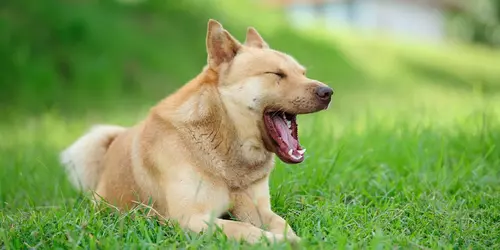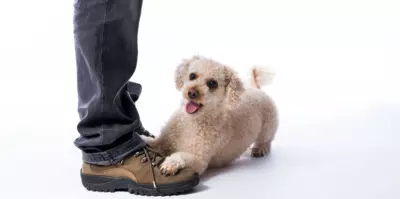Why Do Dogs Yawn?
- 06 Sep 2023
- 4m read
.jpg)
As a pet parent, you've probably noticed your dog yawning from time to time. But have you ever wondered what it means when a dog yawns? Is it simply a sign of tiredness, or is there more to it? In this article, we'll explore the various reasons for those adorable doggy yawns.
What Does it Mean When a Dog Yawns?
Yawning is a universal behaviour in both humans and dogs. While it's commonly associated with drowsiness or boredom, dogs can yawn for a variety of reasons. Let's take a closer look at some of the most common explanations for why your furry friend may be yawning excessively.
Why Does My Dog Yawn So Much?
There’s several meanings behind chronic yawning, some of which include:
Fatigue and sleepiness
One of the most straightforward reasons dogs yawn is because they're tired. Just like humans, dogs need their beauty sleep. If your pup has been running around, playing fetch, or simply expending a lot of energy throughout the day, yawning may be their way of signalling that it's time for a nap.
Stress and anxiety
Dogs are sensitive creatures, and they can experience stress and anxiety, just like we do. When faced with a stressful situation, such as a visit to the vet or exposure to loud noises, some dogs may yawn as a way to cope with their anxiety. It's a self-soothing behaviours that helps them relax.
Communication
Believe it or not, dogs use yawning as a form of communication. It's their way of signalling to other dogs or humans that they're feeling uneasy or uncomfortable in a particular situation. This can be especially helpful in dog-to-dog interactions, where a yawn can serve as a non-aggressive way to diffuse tension.
Cooling down
Dogs don't sweat like humans, so they have alternative ways to regulate their body temperature. Yawning is one of these methods. When a dog yawns, it helps cool down their brain, which can be particularly beneficial on a hot day or after a vigorous play session.
Social bonding
Yawning can also be a way for dogs to strengthen social bonds with their owners. It's often referred to as "contagious yawning." If you yawn in the presence of your dog, they may yawn in response, creating a sense of connection and empathy.
Discomfort or pain
In some cases, excessive yawning may be a sign that your dog is experiencing discomfort or pain. If your dog's yawning is accompanied by other concerning behaviours, such as whimpering, limping, or changes in appetite, it's essential to consult your vet to rule out any underlying health issues.
Do Dogs Yawn When They’re Happy?
Now that we've explored various reasons why dogs yawn, you might be wondering if dogs also yawn when they're happy. The answer is yes, they can. Dogs express their emotions in many ways, and yawning can be a part of their happiness repertoire.
Contentment
When a dog is relaxed and content, they may yawn as a sign of comfort. This is often seen when a dog is snuggled up in their favourite spot, enjoying the warmth of the sun, or feeling secure in their owner's presence.
Bonding
Yawning can also be a way for dogs to express their emotional bond with their human companions. It's not uncommon for dogs to yawn when they're enjoying quality time with their owners, whether it's during a cozy cuddle session or while taking a leisurely stroll together.
After playtime
After an energetic play session, your dog may yawn as a way to release built-up tension and show that they've had a blast. It's their way of saying, "I had so much fun!"
Positive associations
Dogs are quick learners and can associate yawning with positive experiences. For instance, if your dog has learned that yawning results in treats, praise, or attention, they may yawn more frequently as a way to communicate their desire for these rewards.
Comfort in routine
Dogs thrive on routines, and when they're in a comfortable and familiar environment, they're more likely to yawn as a sign of contentment. This is often observed when they're settling in for a peaceful night's sleep or enjoying their daily routine.
So, the next time your dog lets out a big yawn, take a moment to assess their surroundings and their demeanour. It's just one of the many ways our furry friends communicate with us, and by paying attention, you can ensure they lead a happy and fulfilling life.




.png)